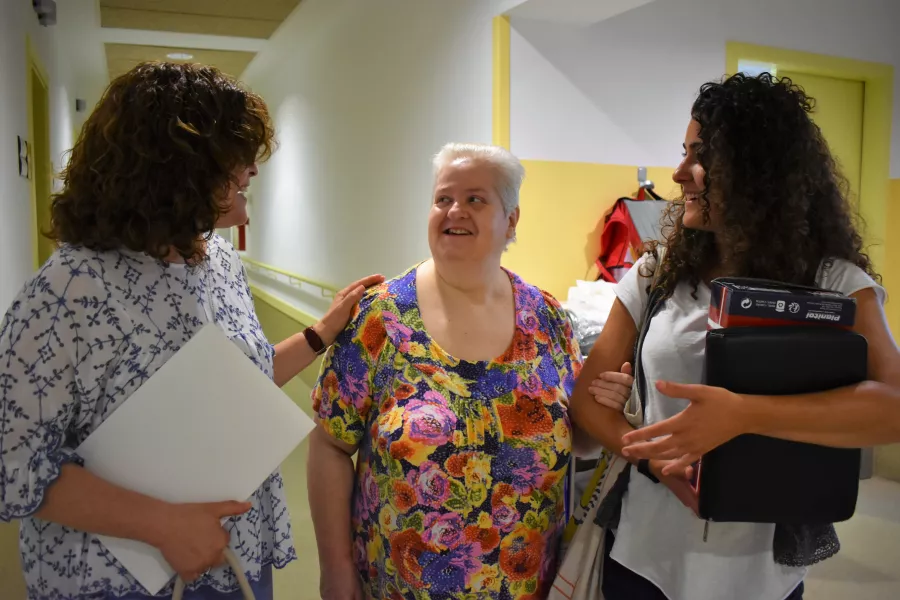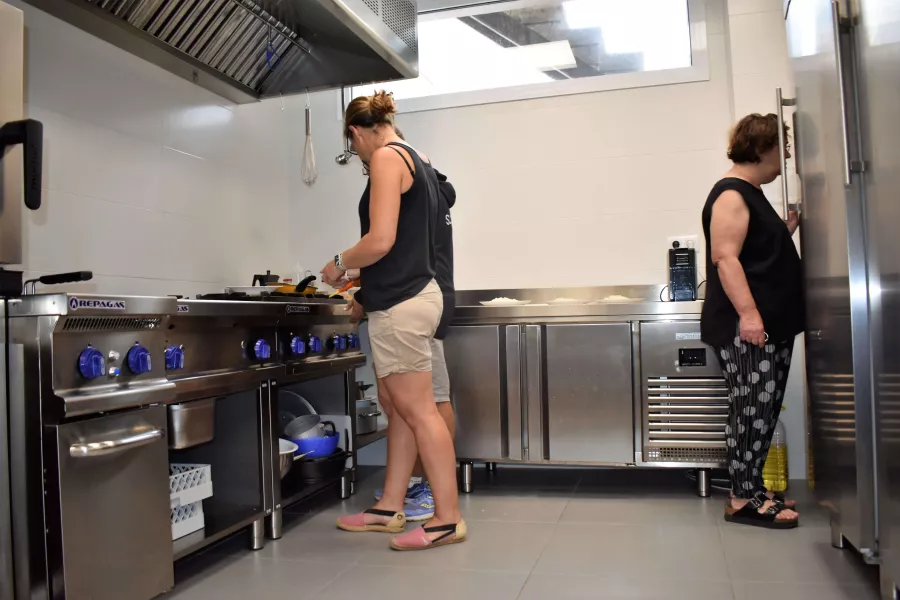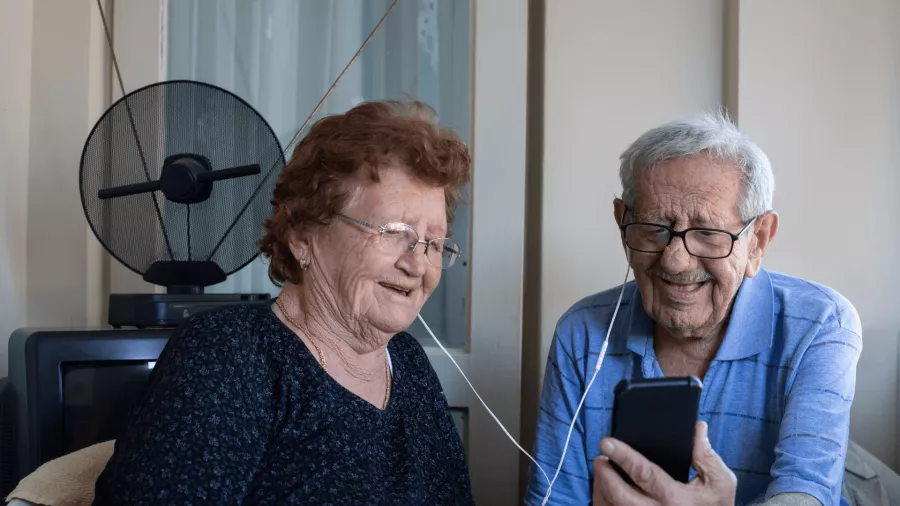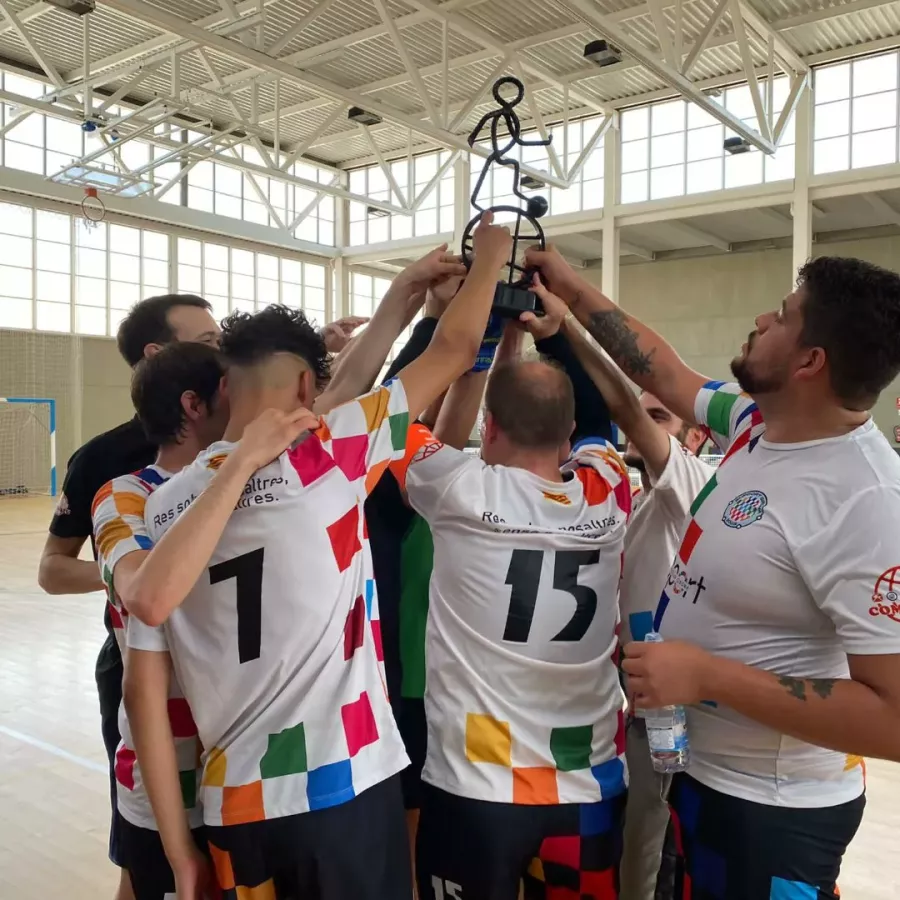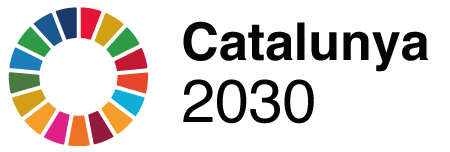Global, flexible and individual support
Support-Girona is an entity that provides comprehensive and individual support to persons with disabilities with whom it has a legal bond by promoting social inclusion and human rights. It works alongside a network of organisations, services, specialists, and people from the environment of the assisted individuals in a personalised manner in order facilitate support mechanisms designated by judicial appointment, notarial act, or self-consent. Moreover, it provides support in the decision-making process of the people being assisted, and its efforts are always guided by the principle of respect. It has a workforce of over 100 specialists, 70% of whom belong to the social field.
Over the years, Support-Girona has evolved into a support system for the exercise of legal capacity by providing supported decision-making services and offering safeguards to protect people from abuse and undue influence, along with fostering their autonomy and full social inclusion in the community, regardless of how complex the circumstances may be. In particular, in 2014, the General Comment No. 1 of the Convention on the Rights of Persons with Disabilities (CRPD) was drawn up, where the responsible committee pointed that Article 12 (i.e., equality under the law) was not interpretable and should be applied even during a crisis by stating not only that a person has the right to be wrong and reject support, but also that the support should be based on the respect for their will, wishes, and preferences.
In 2020, Support-Girona started a new strategic insight process for the period of 2021–2024 with the intention of focusing its energies and resources towards generating a greater impact on society and on the people to whom it offers support. In this insight process, the organisation is projected as a laboratory for social innovation at the service of specialists and entities who work with and for persons with disabilities.
Open Space is a service that is an alternative to the existing resources for responding to people with psychosocial disabilities who are in critical situations of social exclusion due to a variety of causes and personal reasons. This is done through health and social support based on the agreement and goodwill of the people using the resources. Open Space is fostered by Support-Girona and the state-run Healthcare Institute (IAS). It is aimed at people who may have issues related to the consumption of toxic substances on top of having mental and behavioural disorders with little connection to the Mental Health and Addictions Network. Its users meet the criteria of severe social exclusion, and all its actions are designed to reduce the stigma and other barriers that negatively affect their social and community inclusion. Majority of the people it supports do not have a family, social support, or financial resources, or if they do, they are scarce (i.e., less than 400 Euros per month). Moreover, some of them are in a situation of homelessness or rooflessness.
The innovation lies in the methodology of intervention. Open Space is a facility that can be used voluntarily by individuals who are in a vulnerable condition, and there is no rule limiting their access. The basic rules of operation are: respect among the users and respect for their decisions on the part of the specialists, who take the approach of minimal intervention.
This resource comes equipped with a kitchen, living room, dining room, washing machine, courtyard, and different spaces for showering and maintaining personal hygiene. This is to ensure a safe environment where the person can cover their basic needs of hygiene and food. Once this first phase has been reached, the aim of the intervention model is to encourage the development of personal skills relating to personal well-being, socialisation, and trust in other resources of the local health and social network.
Open Space is attended by specialists from Support-Girona and the IAS and is available from 8.00 a.m. to 8.00 p.m. from Monday to Friday, with reduced opening hours over the weekends. During these hours, the users are invited to participate in the centre’s routine activities, such as preparing meals, cleaning, doing laundry, gardening, and organising the space. The spaces and moments of social interaction can be adapted according to the attendance and profile of persons at any given moment.
From homelessness to adequate housing
In two years, more than one hundred people have benefited from this service, 90% of whom have gone from being homelessness or rooflessness to living in adequate housing. Standout achievements of the intervention methodology include the follow-up of medication, reduction of involuntary admissions to psychiatric units, acquisition of healthy life habits, and improvement in the supported person’s socialisation. On average, a user stays in the facility for a period of one year.
The ultimate goal of Open Space is to provide assistance through which the supported persons can develop the capacity to be autonomous without the supervision of specialists.
For its implementation in 2020, Open Space counted on the participation of La Caixa Foundation and Dipsalut. Moreover, in 2021, it received the European Association of Service Providers for Persons with Disabilities (EASPD) Innovation Award, which recognises innovative European practices for the social inclusion of persons with disabilities.
In Girona, the long psychiatric stay facilities were closed in 2004. In 2022, the process started in Catalonia, which took the community-based model of mental health care in Girona as a reference. Open Space is one of the alternative community resources that was used as an example for the changes that will be gradually implemented in Catalonia in order to convert the current long-stay facilities in mental hospitals.
In 2021, Support-Girona created the Support Lab Vital to promote independent living in the community with the support of the consultancy Alter Civites. This space works towards:
- Recognising the fundamental value of each unique person in our collective transformation by being aware of their strengths and potential.
- Achieving a community environment that is welcoming, accessible, and inclusive.
- Empowering specialists and organisations to offer better support.
- Transforming service systems in all their dimensions (i.e., professional support, financial benefits, products, support technologies, housing, etc.) so that they can respond to the supported persons right to live independently in the community.
The approach consists of a fourfold perspective:
- It improves the capabilities of the persons who want to live independently in the community by providing support for it.
- It transforms the community environment.
- It empowers the specialists and organisations.
- It improves the service and support systems.
In short, it supported people and their rights by promoting self-empowerment, improving the services and support systems, and transforming the community environment.
Support-Girona, with a state subsidy from the programme subject to the endowment taxation of 0.7% on account of personal income tax, has launched the Aging at Home project.
Overall goals
- To extend the stay at the usual home of people over 65 years of age
- To organise all the existing resources in the network so that the supported person receives good care in their own home
- To maintain and enhance the person’s social relationships with their closest environment to avoid social isolation
- To coordinate with other elderly care organisations to improve support and fight unwanted loneliness
- To provide counselling and support for family members that have dependents over 65 years of age
- To disclose the rights of the elderly
Specific goals
- To furnish and provide services and resources to ensure good home care
- To encourage the supported persons to participate in social activities in a familiar environment
- To participate in the development of protocols to prevent and/or detect abuse of the elderly
- To give talks at residential centres and at the resources of the elderly care network
- To offer one-on-one talks to family members, specialists, etc.
- To ensure that direct assistance is available for different specialists; family workers, nursing, etc.
El club de futbol Support-Girona és una iniciativa impulsada per crear un espai terapèutic i de suport emocional, en què la persona amb una discapacitat esdevé el centre d’una xarxa coproduïda de suport. Les dinàmiques esportives són l’eix de l’acompanyament psicosocial i pedagògic.
Sota el paraigües de la Convenció de Drets de les Persones amb Discapacitat, Support-Girona defensa amb aquesta iniciativa la igualtat d'oportunitats i inclusió comunitària, eliminant les barreres socials i discriminatòries existents, i enfortint el seu equilibri psicològic i independència, a més de fomentar així els objectius de desenvolupament sostenible i hàbits de vida saludables.
La idea, que es va materialitzar a l’any 2021 i que amb el temps ha esdevingut un èxit, era que l’equip participés en una lliga de persones amb discapacitat intel·lectual que s'organitza a les comarques Gironines, amb la voluntat de promoure els valors de l'esport i la seva essència terapèutica per millorar la qualitat de vida de les persones de l’equip.
Objectius generals
Promoure la inclusió social de persones amb discapacitat i/o malaltia mental co-planificant activitats esportives i terapèutiques
Crear una xarxa de suport social basada en l’enfortiment d’habilitats de gestió emocional i afrontament de conflictes
Fomentar el benestar personal, promovent un estil de vida saludable d’acord amb els Objectius de Desenvolupament Sostenible.
Objectius específics
Organitzar i co-desenvolupar activitats esportives adreçades a persones especialment vulnerables
Reforçar hàbits saludables fomentant el consum de fruita i promovent les dutxes després de la pràctica de l’esport
Incrementar les competències relacionals de les persones acompanyades a través dels entrenaments, de l’espai terapèutic i de la participació en la lliga
Sensibilitzar l’entorn sobre els drets de les persones amb discapacitat i reduir l’estigma social que afecta als seus drets i a llur autoestima
Fer ús de serveis comunitaris per fer activitats esportives-terapèutiques.
Com ho fem?
L’activitat es desenvolupa al Pavelló de Santa Eugènia de Girona. Cada dimecres de 16 a 17.30h es fan els entrenaments i el guiatge de les dinàmiques grupals de suport psicològic. Els partits es disputen els diumenges en diferents poblacions de la demarcació de Girona (Olot, Ripoll, Banyoles, Figueres). L’equip també fa activitats arreu de Catalunya.
Els entrenaments setmanals ajuden a les persones en les seves habilitats tàctiques i a prendre decisions en situacions complexes. El mètode de la co-creació implica programar els entrenaments amb el guiatge dels participants. En les dinàmiques terapèutiques i de suport que s’hi fan, els participants expressen necessitats i conflictes. Aquests espais semi-estructurats permeten crear un grup de suport entre iguals i professionals. L’esport és el vehicle per ensenyar com gestionar conflictes i emocions.
Partits de simulació realitzats amb els professionals de suport, que permeten el modelatge pedagògic i el reforçament de vincles.
Participació en els partits de la “Millor Lliga del Món”.
Participació al MIC Integra, prestigiós torneig de futbol 7.
Participació als Jocs Emporion, iniciativa de la Diputació de Girona, on les entitats s’agrupen per practicar diversos esports.
Viatges per preparar la temporada i gaudir d’activitats d’oci i lleure.
El club de futbol està constituït per un grup de persones molt heterogeni, amb diferents necessitats de suport. Algunes d’elles tenen una discapacitat psicosocial, i d’altres, conviuen amb una discapacitat intel·lectual de diferents graus. Això permet enriquir les dinàmiques esportives-terapèutiques compartint habilitats i coneixements directament extrets de les experiències personals.
Pel que fa a l’edat, el club de futbol permet un intercanvi intergeneracional de coneixements i valors. La persona més jove té només 18 anys i la més gran 55; fet que constata l’establiment de vincles socials basats en el suport recíproc sense barreres.
Un munt d’èxits!
Durant 2 anys, 30 persones han creat aquest espai esportiu-terapèutic. Les seves intervencions han estat constants. I aquesta constància reflecteix els beneficis (inquantificables) psicològics i físics que han obtingut.
Les trobades organitzades han permès crear vincles entre els integrants del club i llurs famílies. Podem quantificar que més de 60 pares, mares i germans han trobat el suport social que precisen per fer front a les dificultats diàries.
Les persones ateses i llurs famílies han construït vincles ferms amb els professionals de Support-Girona i amb persones ateses i professionals d’altres entitats.
Premi Valors en Acció, gràcies als valors positius demostrats en la primera temporada.
Campions de la lliga 2021/2022!
Els integrants de l’equip (un 90%) compten, arran de la participació en l’espai esportiu-terapèutic, d’una xarxa social més rica i de lligams comunitaris forts. Això ha permès que paradoxalment guanyin autonomia. Tenen el suport emocional necessari per prendre decisions i viure els errors com a oportunitat de creixement.
Els professionals han detectat que els integrants, llur vida girava al voltant dels tòxics, han reduït el consum. Han desenvolupat consciència que els han empès a començar un tractament de deshabituació.
Els integrants (80%) són més conscients dels seus drets a l’oci i cultura. La seva autoestima ha augmentat i han après com resoldre els problemes.
Els integrants han demostrat a llur entorn que són capaços de responsabilitzar-se dels seus actes, d’aprendre habilitats i de convertir-se en figures referents en l’esport.
Alguns jugadors del club han estat seleccionats per formar part de l’equip FC Girona Genuine, que disputa la lliga professional a nivell estatal.
Indicadors quantitatius i qualitatius
Mesurem l’índex d’assistència a activitats esportives-terapèutiques.
Comparem les persones que volen ser integrants amb les que decideixen abandonar el club. Fem: nº d’altes-nº de baixes/total de membres X 100 per conèixer el creixement.
Donada la vulnerabilitat i dificultats dels membres, la participació i consolidació és més elevat del què prevèiem. El 80% participa en les activitats. El 90 % es mantenen en el club.
Analitzem experiències factorialment.
Repte 1: Promoció de la inclusió social de les persones amb discapacitat i de llurs drets humans.
a) Implicar a les persones vulnerables en la co-creació d’activitats esportives i terapèutiques els ha permès crear lligams amb llurs iguals, amb professionals de Support-Girona i d’altres entitats i amb la comunitat.
b) L’entorn social ha estat testimoni de les seves habilitats i talents. Aquestes han estat capaces de plantejar objectius i reptes, prendre decisions i convertir-se en esportistes i figures de suport.
Repte 2: Augment de l’autoestima, de l’autonomia i de la resiliència.
a) Les persones amb discapacitat han après a afrontar problemes i a prendre decisions, donant suport als seus iguals.
b) Exercir els seus drets a l’esport i a l’oci ha enfortit la seva autoestima.
Un projecte col·laboratiu
La participació en la lliga i altres competicions ha permès crear una xarxa social on el centre són les persones ateses. S’han creat vies de col·laboració entre fundacions i famílies, el que ha generat metodologies de treball en xarxa eficients, escalables i replicables.
El treball en xarxa ha millorat la comunicació entre serveis, famílies i persones acompanyades. Fet que ha facilitat el seguiment i l’atenció donada als col·lectius vulnerables. Ha possibilitat dirigir eficaçment els recursos assistencials i terapèutics per prevenir i reaccionar davant de daltabaixos psicològics i conflictes socials. Els serveis han emprat un model d’atenció holístic que ha promogut l’autonomia, la inclusió social i l’exercici de drets de les persones.
El treball en xarxa entre entitats d’habitatge, de suport a la presa de decisions, d’atenció psicològica i d’inserció sociolaboral han promogut la creació de plans de treball integrals i la promoció de la qualitat de vida de les persones ateses.
Pressupost
Fins al moment, Support-Girona financia la major part del projecte i hi destina una part de l’ajut de Fundació La Caixa a l’entitat per activitats generals de cultura, oci i lleure. El pressupost inclou despeses del Consell Esportiu del Gironès, els equipaments, despeses de les estades, desplaçaments i les retribucions de les persones que porten a terme el projecte.
Un projecte de futur
La sostenibilitat futura de la iniciativa es projecta sobre:
a) Tallers pedagògics per formar als integrants com a mentors dels nous membres del club, promovent llur integració psicosocial.
b) Creació, en la fundació, d’un coordinador d’activitats esportives-terapèutiques, amb ajut de professionals que supleixin les possibles baixes.
c) Jornada de portes obertes per donar a conèixer el projecte i animar a la comunitat a participar.

